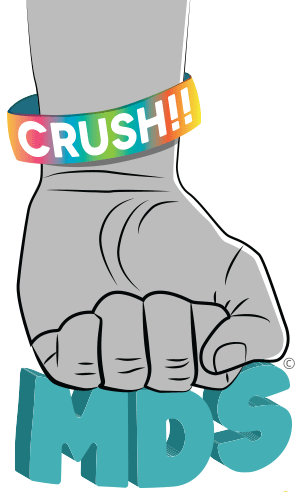Predicting Response To Your Myelodysplastic Syndrome (MDS) Treatment
Azacitidine (Vidaza®) and decitabine (Dacogen®) are FDA-approved drugs for the treatment of MDS. While these drugs help many patients with MDS, sometimes patients who initially respond to these drugs eventually lose their response. Why? Why do the drugs stop working? MDS-CRC investigators are trying to answer this question. Through CRUSH!!MDS, we are recruiting patients who have not responded or lost their initial response to azacitidine or decitabine. Patients will be able to have blood drawn at the time of a routine visit to their local doctor and we will arrange for the blood to be delivered to Weill Cornell Medical College, at no cost to the patient. At Weill Cornell, the blood will be analyzed in the laboratory of Dr. Joseph Scandura, M.D.
How will scientists be able to use my blood to answer this research question?
When a patient has MDS, the chemical structure of their DNA changes as a result of their disease. DNA is the material within our cells that contains our genetic information (i.e., the chemical information within our cells that is unique to us). One mechanism by which a person's DNA can change is called "methylation," where an extra piece of chemical matter, known as a "methyl group," is added to their DNA. Patients are treated with "hypomethylating agents," which block the process of methylation in an effort to control their disease. However, not every patient responds to treatment with these drugs, and our goal is to understand why certain patients fail to respond to treatment while others achieve success.
With this new initiative, we are looking to characterize the "methylation profiles" of our MDS patients who do not respond to treatment with these agents. We can do this by examining the DNA within the cells found in a patient's blood and creating a profile that will help us characterize their disease in hopes of discovering patterns that may give us an indication as to why certain patients respond while others do not.
How do I know if I qualify to participate in this study?
Male and Female Patients with MDS who meet all of the following criteria are eligible for participation in this study:
- At least 18 years of age with pathologically confirmed MDS
- Must have received at least 4 cycles of decitabine-based or 6 cycles of azacitidine-based therapy and are either refractory to, relapsed after or intolerant to prior therapy with either agent.
- Primary failure/refractory: Stable or worsening disease after a minimum of 4 cycles of decitabine-based or 6 cycles of azacitidine-based therapy
- Secondary failure/relapse: Bone marrow blast count increase or loss of hematologic response after initial treatment response with hypomethylating agent-based therapy
- Intolerance: Intolerance of hypomethylating agent-based therapy regardless of number of cycles completed and clinical response
I think I am eligible. How do I sign up?
Please review the informed consent form and record any questions you might have for the study team. After reviewing the informed consent form, please complete and submit the study questionnaire.
What happens next?
Once a patient has completed their registration via the online portal, a study coordinator from the Weill Cornell Medical College will reach out to each patient's local treating hematologist and/or oncologist to confirm that they are eligible to participate. If a patient meets our eligibility criteria, they will receive a study consent form via regular mail, as well as a sample collection kit for specimen procurement. Patients will bring the sample collection kit to their local treating physician, who will then collect and submit the sample back to the investigator at the Weill Cornell Medical College using the instructions and shipping label provided in the sample collection kit.
Sponsor: Weill Cornell Medical College
Contact: Stephanie Corrigan
Phone: (646) 962-2082
Email: crushmds@med.cornell.edu


